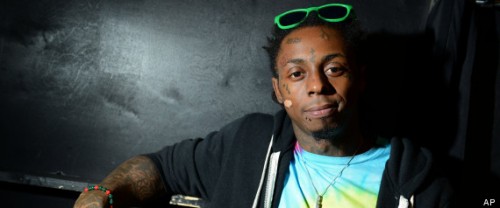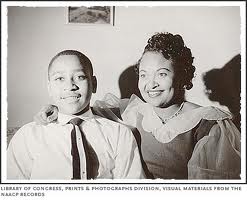Lil Wayne, Emmett Till Backlash: Rapper Faces Scrutiny Over Rap Lyric
Share
Explore Our Galleries
Breaking News!
Today's news and culture by Black and other reporters in the Black and mainstream media.
Ways to Support ABHM?
From the Huffington Post, Black Voices
[T]he Grammy Award-winner is making headlines once again for his cameo on Future’s recently leaked track titled, “Karate Chop.”
The song which is set to appear this weekend on DJ Smallz’s upcoming mixtape “This Is That Southern Smoke Vol. 4,” finds the New Orleans native making an explicit reference to “beating” a woman’s genitals in a manner similar to the beating Emmett Till took at the hands of Roy Bryant and J. W. Milam.
On August 28, 1955 Till was kidnapped from his great-uncle’s home and taken to a barn. Bryant and Milam beat, tortured and killed Till, throwing his body, attached by barbed wire at the neck to the fan of a cotton gin, into the Tallahatchie River.
Till’s killing, and the subsequent acquittal of Bryant and Milam sparked outrage across the country and is widely viewed as a tipping for the civil rights movement.
Considering this history, the controversial lyric has since received a tremendous amount of backlash from many including Till’s family….
“I just couldn’t understand how you could compare the gateway of life to brutality and punishment of death,” she continued. And I feel that they don’t have no pride and no dignity as black men. Our family was very, very offended. Very hurt, disturbed by it.“
According to the Chicago Sun-Times, Future’s label, Epic Records, confirmed that the current version of “Karate Chop” circulating online leaked without the company’s authorization and added that the official version “has removed those lyrics from that song.”
To listen to a Till relative’s conversation with Dr. Boyce Watkins about the family’s objections, click here.
To read more Breaking News, click here.













Comments Are Welcome
Note: We moderate submissions in order to create a space for meaningful dialogue, a space where museum visitors – adults and youth –– can exchange informed, thoughtful, and relevant comments that add value to our exhibits.
Racial slurs, personal attacks, obscenity, profanity, and SHOUTING do not meet the above standard. Such comments are posted in the exhibit Hateful Speech. Commercial promotions, impersonations, and incoherent comments likewise fail to meet our goals, so will not be posted. Submissions longer than 120 words will be shortened.
See our full Comments Policy here.